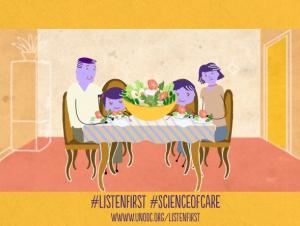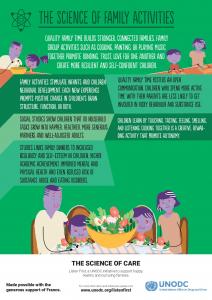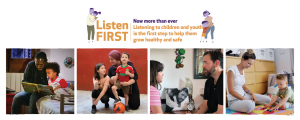UNODC’s Listen First helps families around the world
May 16, 2022Human Rights - Social Gov originally published at Human Rights - Social Gov
UNODC’s Listen First initiative tries to help families worldwide raise happier, healthier children.
— Giovanna Campello, Chief, UNODC Prevention, Treatment & Rehabilitation
VIENNA, AUSTRIA, May 12, 2022 /EINPresswire.com/ — The International Day of Families is observed by the United Nations (UN) each year on May 15 to spread awareness about the benefits of family systems and the social and economic processes affecting families.
The family is one of the most powerful institutions affecting children’s overall development and well-being. It can either protect young people from or put them at a higher risk of substance use and other risky behaviors, according to the United Nations Office on Drugs and Crime (UNODC).
“Effective drug use prevention strategies should therefore focus on the healthy and safe development of children and youth to realize their potential. One powerful way of doing so is strengthening parenting skills and the conditions that support healthy, happy families,” explains Ms. Giovanna Campello, Chief UNODC Prevention, Treatment & Rehabilitation Section.
To that end, ‘Listen First‘ is a UNODC initiative, based on science, investing in materials to aid children and youth’s well-being, their families, and their communities. It emphasizes that listening to children and youth is the first step to helping them grow healthy and safe and encourages other positive behaviors that parents and caregivers can do to help their children’s healthy development.
Research proves that warm, caring, and involved parenting are some of the most important factors protecting especially young children and early adolescents from initiating substance use. On the other hand, children growing up in a marginalized and deprived community with little or no family support, and children subjected to family neglect and abuse, are especially at risk.
The Science of Family Activities
Children whose parents are positively involved in their lives, such as help them with their homework, stay informed about their lives and friendships, and maintain an open communication, are more well-adjusted, perform better in school, and are less likely to engage in risky behaviors including violence, risky sexual behavior, and substance use.
Quality family time builds stronger, more connected families. Doing family activities together, such as sports, cooking, and playing games or music helps families bond and build trust. In addition, it improves communication and creates more self-confident children.
Research shows that children who spend more active time with their families are less likely to engage in risky behavior, including substance use. Studies have even linked having family dinners together to increased resiliency in children, higher academic achievement, improved mental and physical health, and reduced risk of substance abuse and eating disorders.
‘Listen First’, especially through its set of videos and science sheets, “The Science of Care” provides families and those working with families with science-based information presented in a fun, engaging way.
The materials are available in English, Spanish, French and other languages at: www.unodc.org/listenfirst
To learn more about ‘Listen First’, sign up for the monthly newsletter here.
Teachers, health workers, and other professionals working in the field of prevention who are interested in using the materials are encouraged to get in touch.
For more information contact:
Jenny Roston Lundstrom
UNODC Consultant
+34 632 74 23 56
email us here
Visit us on social media:
Facebook
Twitter
LinkedIn
Other
Listen First: The Science of Family Activities (UNODC)
![]()
Human Rights - Social Gov originally published at Human Rights - Social Gov



 ,
,



